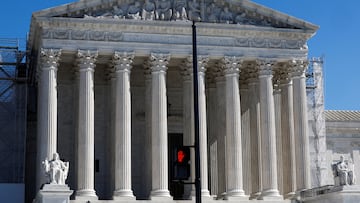Supreme Court rules to keep Trump on ballot: What is the 14th Amendment and why did the justices decide in his favor?
The US Supreme Court unanimously ruled to let Trump stay on the ballot in all 50 states overruling Colorado’s ban based on Section 3 of the 14th Amendment.

So far, three states have determined that former President Donald Trump should not be on the ballot based on Section 3 of the 14th Amendment that bars insurrectionists from holding office. Voters and academic groups have brought challenges to Trump being on the ballot in states across the country claiming that his efforts to overturn the 2020 elections results that culminated in the January 6 assault on the US Capitol amounted to insurrection.
On Monday, the Supreme Court handed down its unanimous decision overturning the Colorado Supreme Courts ruling to ban Trump. Effectively that puts an end to all remaining pending challenges and the other bans imposed, but on hold until now, by Illinois and Maine.
“Responsibility for enforcing Section 3 against federal officeholders and candidates rests with Congress and not the states,” SCOTUS said in its opinion. “The judgment of the Colorado Supreme Court therefore cannot stand.”
By allowing Colorado to ban Trump from the ballot, the justices agreed, would “create a chaotic state-by-state patchwork, at odds with our Nation’s federalism principles.”
The Supreme Court however, did not clear Trump of the rulings that have found him to have “engaged in insurrection” as he had argued for in his brief to the court. This leaves the door open for criminal trials to proceed should the court rule that he does not have immunity, another issue on which the Supreme Court will hear arguments in April.
What does the case have to do with the 14th Amendment?
The 14th Amendment was ratified after the Civil War in 1868 to keep former Confederates out of the government. Section 3 of the amendment states that officials who have held public office in the country and have participated in acts of “insurrection or rebellion” after having taken an oath cannot return to office unless two-thirds of both Houses approve removing such disqualification.
“The clause was designed to operate directly and immediately upon those who betray their oaths to the Constitution, either by taking up arms to overthrow our government or wage war against our government by trying to overturn a presidential election through a bloodless coup,” argued two conservative legal scholars in The Atlantic.
The scholars J. Michael Luttig and Laurence H. Tribe believe that there is sufficient evidence to show that Donald Trump was, at least in part, responsible for the attack on the Capitol on January 6th and that his participation should disqualify him from seeking public office.
According to an investigation by Washington prosecutor Jack Smith, the former president is responsible for orchestrating a plan to annul the results and encourage his supporters of the Capitol insurrection on 6 January 2021. Based on the findings of the investigation, the former president was charged with conspiracy to defraud the United States, conspiracy to obstruct an official proceeding, obstructing and attempting to obstruct an official procedure, and conspiracy against rights. In the case in Georgia, Trump was indicted and charged with thirteen counts, but none included treason or sedition.
Despite Trump’s alleged role in inciting the riots in the capital, it is very unlikely that this amendment would be invoked. According to Steven Calabresi, a law professor at Northwestern University, the key is that the words “insurrection” and “rebellion” are mentioned in the cases, but neither the Georgia nor the Washington investigation mentions them as such.





